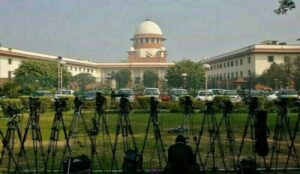 MOON Desk: A five-judge bench, headed by Chief Justice D.Y. Chandrachud, started hearing a batch of petitions on Wednesday challenging the reading down of Article 370 of the Indian constitution that bestowed special status on India-held Jammu and Kashmir. “The Indian parliament cannot declare itself as a constituent assembly,” senior counsel Kapil Sibal, who appeared on behalf of the petitioner, told the Supreme Court .
MOON Desk: A five-judge bench, headed by Chief Justice D.Y. Chandrachud, started hearing a batch of petitions on Wednesday challenging the reading down of Article 370 of the Indian constitution that bestowed special status on India-held Jammu and Kashmir. “The Indian parliament cannot declare itself as a constituent assembly,” senior counsel Kapil Sibal, who appeared on behalf of the petitioner, told the Supreme Court .
According to The Wire, Mr Sibal made his submissions on behalf of the petitioner, Mohammad Akbar Lone, on how the Modi government unilaterally unravelled India’s unique federal scheme five years ago, while undermining crucial elements of the due process and the rule of law. Tracing the history of the “accession” of the princely state of Jammu and Kashmir to India, which Pakistan disputes, Mr Sibal shed light on Clause 3 of Article 370 which provided that any alteration to the relationship between the state of Jammu and Kashmir and the Indian union could only be made upon the recommendation of the constituent assembly for the state.
Indian chief justice starts hearing slew of petitions against ending Article 370 for held Kashmir
Article 370 (3) of the Indian constitution, before its reading down in 2019, said: “Notwithstanding anything in the foregoing provisions of this article, the President may, by public notification, declare that this article shall cease to be operative or shall be operative only with such exceptions and modifications and from such date as he may specify: Provided that the recommendation of the Constituent Assembly of the State referred to in clause (2) shall be necessary before the President issues such a notification.”
Will of the people
During the hearing, Mr Sibal contended that the concurrence of the state government provided by the governor did not express the will of the people. He argued that Indian-held Jammu and Kashmir had a separate constitution, and therefore, the parliament had a limited scope to enact legislation for the state. Powers given to the state by its own constitution were read down by parliament, he submitted.
But the constitution bench interrupted Mr Sibal to question him whether a provision, intended to be temporary in 1950, could become permanent in 1957, only because the state’s constituent assembly had completed its task of framing the constitution for the state, and dissolved itself.Mr Sibal explained that the proviso in Article 370(3) was incorporated to ensure that the article could be changed during the existence of the state’s Constituent Assembly.
The use of the word “temporary” in the marginal note of Article 370 serves the purpose of indicating that when Article 370 was introduced, it could be amended/abrogated with the recommendation of the Constituent Assembly of Jammu and Kashmir, he clarified. Mr Sibal suggested framers of the constitution in 1950 would have included a reference to the state legislature if they had intended that it should be able to make such a recommendation.
In his view, the state’s Constituent Assembly had the exclusive power to determine the state’s relationship with India and to recommend the abrogation or modification of Article 370. The petitioner submitted that the constituent assembly stands for enacting a constitution for the future, and it is essentially a political exercise to take into account the aspirations of the people.
“Constitution itself is a political document; drafting of [the] constitution is a political exercise. Once the constitution comes into place, all institutions are governed by the constitution, and those institutions are limited in the exercise of their powers consistent with the provisions of the constitution,” he told the bench.
“Parliament cannot convert itself as a Constituent Assembly. That’s done. [The] Indian Parliament cannot declare itself as a Constituent Assembly. Where does parliament get that power to decide the legislature of the state?” he asked.





